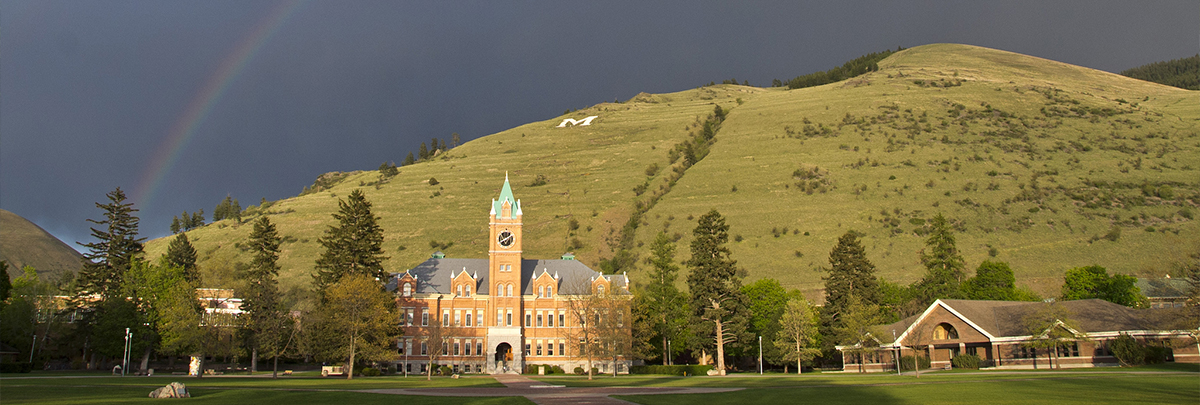Frequently Asked Questions

The application deadline for the Specialist in School Psychology (SSP) program is December 1st.
School psychologists are individuals that have a positive impact on the academic, social/behavioral, and mental health competence of all children and their families. They work proactively with others in schools and the community in the identification and remediation of social/behavioral and educational problems through data-based decision making. School psychologists work with educators, parents, and other professionals to create safe, healthy, and supportive learning environments for all students. There are great resources available at the National Association of School Psychologists.
You can find an application online at the UM Graduate School.
There are various differences between SSP and Ph.D degrees. At the University of Montana, the Ed.S. degree typically takes three years, including two years of coursework and practicum experiences and one year of internship. It is approved by the National Association of School Psychologists (NASP), with graduates typically working in Pre-K to grade 12 schools around the country. On the other hand, the Ph.D. program typically takes 5-6 years to complete, including 4-5 years of coursework and practicum experiences, and a one-year doctoral internship. Students also participate in a variety of research endeavors, including the completion of a dissertation. Doctoral graduates work in a variety of settings, including schools, pediatric clinics or hospitals, private practice, public agencies, and universities.
Students who complete school psychology programs at the University of Montana are recommended for licensure to the state Office of Public Instruction. Individuals are not eligible for licensure in Montana until the Licensure Manager verifies to the Office of Public Instruction that all academic requirements for the licensure requested have been completed. Each individual recommended for initial licensure in Montana is required to complete a national fingerprint-based background check. Teaching licenses are issued by OPI upon receipt of the licensure application, the university recommendation, and results of a background check.
All licensure application materials are routed through the Licensure Office at UM PJW College of Education who then completes the university portion and submits all the materials to OPI.
Information about licensure through the Montana Office of Public Instruction.
We do not offer a NASP-approved respecialization program in school psychology. However, we do allow some individuals seeking Office of Public Instruction Class 6 Education License respecialization within the state of Montana to take some of our graduate courses. This is done on a case-by-case basis and with instructor permission. Please contact the Director of the School Psychology Program.
Your letter writers can use the online system or they may opt to send hard copies directly to the Psychology Department. If they choose the online system, while filling out the online application you will be asked to provide an e-mail address for each letter writer. Your letter writers will receive an e-mail message with instructions for completing the recommendation online.
No, GRE scores are not a required component of your application materials.
All applications are read and given thoughtful consideration. Applications are not eliminated on the sole basis of GPA alone, though we do ask that applicants have an undergraduate GPA of at least 3.0. We consider your GPA along with other possible indicators (letters of recommendation, research experience, clinical experience) as a whole, so that no one factor is considered in isolation.
At this time, students are not required to have an undergraduate degree in Psychology and faculty review all applications equally, although we do expect that applicants have a foundation in the science of psychology.
Each candidate's application is evaluated by at least one member of the school psychology faculty, with most files being read and evaluated by multiple faculty members. Highly ranked candidates are contacted for an initial phone or Zoom interview. Following phone interviews, the admissions committee selects a pool of finalists invited to participate in our interview day in February. Attendance at interview day is strongly recommended, but not mandatory. Please also inquire about available funding to attend interview day in person. Individual alternative interview arrangements may be possible.
The School Psychology Program typically admits 5 to 10 Specialist students per year.
Specialist students typically do not receive funding; however, because of the significant need for school psychologists in the state of Montana, the Montana Office of Public Instruction has a tuition reimbursement program.
No, we do not offer online graduate level course work nor do we offer an online degree option.
Yes, our program is a full-time program, and all of our courses take place on our campus in Missoula. Students in our program have off-site practicum placements in local Missoula schools.
School Psychologists traditionally focus on the prevention, evaluation, and treatment of all children. School psychologists will work on many issues that have the potential to impact educational functioning. Clinical psychologists have traditionally focused on the evaluation and treatment of individuals with chronic mental health disorders. However, there is overlap between the two career options, with both school and clinical psychologists working in a variety of settings. There are a number of excellent materials available for helping you to choose the type of program that would best fit your needs from the National Association of School Psychologists. It is worth your time to make sure that you are selecting programs that will meet your career goals and interests.
Absolutely! We offer specific training in working with Native American, LGBT (lesbian, gay, bisexual, and transgender), and rural populations. Several of our faculty have research emphases in diversity, as well. We welcome and encourage applications from individuals of diverse backgrounds, including differences on basis of age, gender, gender identity and expression, ability status, ethnicity, religion, sexual orientation, nationality, and socioeconomic background. We strive to represent diversity in these areas among our faculty and student body.
Generally, no; courses in our school psychology program are available only to admitted graduate-level degree-seeking students in Psychology. Some departmental graduate-level coursework that is not clinically focused may be available to non-degree seeking students, but enrollment in these courses requires the instructor's consent.
